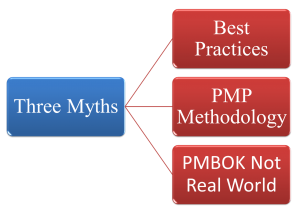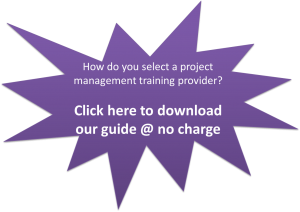We do realize that some will object to what we write here – which fine with us. We do know professionals and those who truly believe in project management and its strategic value will likely agree with what we post here.
Those who maybe offended – if they care – we ask them to think twice about reacting and re-read what we write here; maybe they did not know what we present here. However, we know that a few (or some) do not care – since they are in project management training just for profit and who cares about their clients.
The three myths about project management training
There are three myths about project management learning and training, which are promoted by those who sell PMP certification training. These myths are often supported, or overlooked, or encouraged, by PMI and some of its chapters and vendors. These three myths are:
Best or Common Practices
The first myth is “PMBOK and PMP covers the BEST practices of project management”
The PMBOK® Guide clearly states that it covers COMMON practices, for most projects, most of the time. “The PMBOK® Guide identifies that subset of the project management body of knowledge that is generally recognized as good practice.“[1]
In other words, unless someone changed the English Language, how come all of sudden those sales people make COMMON = BEST?
PMP Methodology
Those same people promote the “PMI Methodology” or “PMP Methodology” or “PMBOK Methodology”
This is another myth since the PMBOK clearly states that it is NOT a methodology, it is a guide, a framework. Practitioners can use any methodology to supplement the PMBOK. “this standard is a guide rather than a specific methodology. One can use different methodologies and tools (e.g., agile, waterfall, PRINCE2) to implement the project management framework.“[2]
PMBOK is not real world
The third myth, currently a hotly debated topic on LinkedIn, is that “the PMBOK is NOT real world” We know that the PMBOK is not enough to manage projects effectively and we wrote on this before. However, what we wrote is that we need the PMBOK processes and more information from other resources. On the other hands, those who claims that PMBOK is not real world, they think the PMBOK is too much!
Our opinion here, is per the following:
(a) PMBOK is not practically written as a procedure, methodology, etc. and it does not includes forms and templates … but provide the guidelines that allows practitioners to develop their internal custom-fit methodology.
(b) Most of those who says PMBOK is not real world – are most likely not managing projects properly. They are either leading technical tasks or managing portions of a project but not a full project.
We do not understand how; some “trainers” even say the above to their clients and participants. Do these people know how to manage projects or knows what it takes to deliver a successful project?
Closing Remarks
 When these traders “sell” project management the way we mentioned above, it is one of two things (to be direct); they are either:
When these traders “sell” project management the way we mentioned above, it is one of two things (to be direct); they are either:
(1) lying to make their products sounds more appealing (better to sell best practices than common practices, do not you agree?) … or
(2) do not know what they are talking about …
I do not know which one is worst, lying or ignorance? You be the judge!
[1] PMBOK® Guide, 5th edition, chapter 1, page 2, 1st paragraph
[2] PMBOK® Guide, 5th edition, chapter 1, page 2, 3rd paragraph

Hello,
Whilst I too do not wish to offend anyone, I will refrain from endorsing the word “lie”. Instead I step back and consider the maater from the perspective of error and of ambiguity.
Errors characterize us all. I am sure most will be able to identify an event that justifies their descrobong it as ‘it seemed like a good idea at the time’!
But PM are human first and PM second. What this means is that they are invariably a product of their experiences and training. If the experiences are ‘narrow’ then this must have consequences. If their training is likewise limited, then that too must have consequences.
Consequences can be negative or positive.
One of the topics introduced in my TViP Colloquium is that of “dulling”. How language inaccuracies find their way into the everyday use of language, even though it is apparent they are inaccurate. I consider this in more detail in the session “Corporations Have No Experience”, and this is the example I will use here.
Corporations are actually Articles of Association, papers that reside in some corporate safe somewhere, they are inanimate. Yet web search “60 years of experience” and very Companies will be found who do make this claim when experience is the sole province of the individual and they do migrate taking their experience with them.
To this we can add the phenomena of “fact-claim discrepancies” and many others. So, back to the question. I do suggest reflecting on ‘intent’.
And that takes us to other topics for another time. Many thanks and Kind Regards, Brian
Hello Brian
Thank you for your feedback and contribution.
The word like is (1) to attract attention and (2) because in some situation it is real.
For examples:
1) a famous organization sponsored significant research on whether project management (as a field) is a profession or not … the answer was it is not a profession. Yet, this organization insists in its marketing to refer to PM as a profession, even have an online publication called “___ of the profession”. Is this an error or a conscious decision to promote their products?
2) the examples I gave in the write up – when people (companies and associations) knows that the PMBOK address common practices but they insist on marketing them as Best Practices … I know for some this is an error because they do not know or understand (which is bad) but for some they know it is not the truth yet they market it as such.
Regards
This comment is By Mark Moore, PMP on LinkedIn:
OK, I’ll chime in (I did read the article). And I’ll deal with the first one last …
PMBOK is, as its title states, a “guide”. It’s a dictionary/encyclopedia intended to be a reference and starting point. It was never really intended to be taken in its raw form and be proclaimed “real world”. There are just too many variants we encounter and it is up to us – the PEOPLE doing the work – to properly manage a project.
The PMP is a certification. It is not and never was a methodology or anything else. I’ve written ad nauseum on this elsewhere. My PMP says I passed an exam. It doesn’t say when, by how much, or based on which version of the PMBOK. Now, my actual experience? That’s a different matter.
The term “best practice” most often gets laid out as some sort of “mission/vision” by a manager who read an article or attended a seminar. In my experience, searching for true “best practice” is an impractical thing. I like to add the work “reasonable” to the front of the phrase. Our organizations do need to improve and enhance our practices, but we need the reasonability factor that incorporates what we can, should, and ought to do in terms of who we are. Setting off on a theoretical journey to be “the best” based on somebody else’s ideas is just folly for the most part.